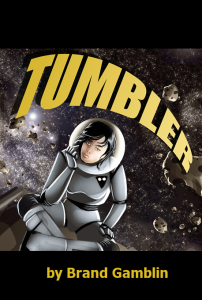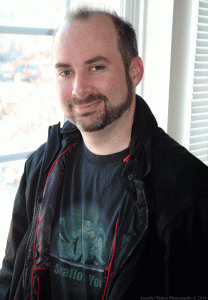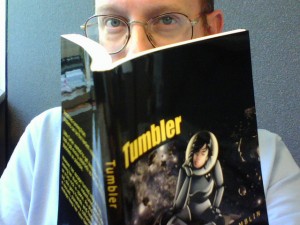Today we have the pleasure of chatting with Brand Gamblin, self-published author of the YA sci-fi novella, Tumbler. A geek after our own hearts, Brand uses his background in computer science working as a video game programmer and (in his non-writing spare time) produces a hit web show, Calls for Cthulhu. In the latest entry for our Self-Publishing Interview Series, we ask Brand about his outlook on writing, the books he’s written for NaNoWriMo and how he’s used technology to market his work.
On Writing
What is your earliest creative writing memory?
I remember doing some pretty horrible Fraggle Rock fanfic when I was about ten or eleven, but it’s foggy. In junior high, I wrote a serial story for the school paper. It was about a girl whose teacher finds a magic spell to open a portal into a Dungeons & Dragons fantasy world.
What does your writing space look like?
I use a netbook to do all of my writing, so I’m pretty flexible on where I can write. I usually get 500 words at the breakfast table before everyone else is awake. At night, I’ll get another 500 in a rocking chair in my bedroom, which faces a bay window overlooking a forest. The chair isn’t particularly comfortable, which is good, because it encourages writing over napping.
Do you listen to music while you write? If so, which artists?
I can’t listen to anything. It sounds weird, but the only way I can write is by speaking in my head and writing down what I “hear”. If I hear something else, even another conversation going on around me, it distracts me from the internal monologue. On the plus side, it makes my written dialog sound a lot more believable.
What’s your favorite part of the writing process?
Outlining. It sounds weird, but that’s the point where I take a general idea, and see whether it really would work as a story. Outlining gives me an idea of how long the story will be, how the pacing will work, and how the characters change. What’s more, when I’m done outlining, I’ve got the story down to about 500 word chunks for each element. That makes writing a lot easier.
How has your background in Computer Science and game programming influenced your writing?
One would think my background would lead me to write about hackers and Matrix-esque cyberpunk stories. In reality, I think the biggest thing it’s given me is the ability to do effective worldbuilding, and organize large ideas into logical smaller chunks. A video game is a massive undertaking, but the ability to look at a huge undertaking and see the smaller parts involved makes a huge difference. That same consideration helps a writer see a whole novel as parts, and keeps it from feeling overwhelming.
On NaNoWriMo
What made you decide to participate in the National Novel Writing Month contest? If you would, please describe both the process in general and your personal experience.

The National Novel Writing Month is a joint project where people from all over the world promise to write a novel over the month of November. It doesn’t have to be a great novel, it just has to be 50,000 words long. In order to do it, each person has to write 1,666 words per day, consistently, all month. It’s a lot harder than it sounds. However, while you’re doing it, you have a support system of others who are in the same boat. And when you’re done with it, you are a novelist. You’re not necessarily the next Stephen King, but you can honestly say that you’ve written a novel. It’s a great feeling.
As soon as I heard about the NaNoWriMo, I wanted to try it. I didn’t really have a story sitting in my desk or anything like that, I just thought it was a neat project, and wanted to try it out. I was a huge Heinlein fan, so I decided to write something in the vein of “Podkayne of Mars” or “Moon is a Harsh Mistress”. Once I’d decided to write a story about “pulling yourself up by your bootstraps”, I sat down in late October and wrote out a general outline. A paragraph that told the whole story. After that, I took each of the sentences, and exploded them out into larger outline format. Each section needed a certain number of subsections, and each one had to be self-contained enough to fit within a chapter. Then, November 1st, I started fleshing it out in earnest.
The story did not stick within the confines I set for it. It twisted and wriggled as I wrote it, causing me to revise my outline again and again. I wasn’t able to keep with my wordcount, forcing me to power through a few weekends to catch up. In the end, November 31st was an all-nighter, where I barely made it to my 50k words.
However, December 1st, I had reached my goal. I made the wordcount, even though I hadn’t finished the story. And so, I sat back down and continued. It took me until January to finish the book, but it was well worth it.
I’ve now written two NaNoWriMo books, and I plan on doing another this year. It’s not because I have anything to prove, it’s just because I love the sprint.
On Marketing and Promotion
Are the different versions of your book (podiobook/eBook/print) targeted to different audiences? What made you decide to choose those routes?
I don’t really try to target an audience. If, during writing, I find that it may work better for one group than another, I will go back and highlight some things, diminish others. One good example of that was in Tumbler. I had intended to write the kind of book I wanted to read, and that worked out pretty well. But along the way, someone pointed out that I had a young protagonist, no sex, no swearing, and no overt violence. From that viewpoint, I realized that it could be a decent YA story, and went back to highlight those sections that benefit most from it.
So I will target the text based on content, but I’ve done very little to alter the text based on format. I did remove a lot of the narration tags while doing the podiobook version (you don’t have to say ‘He said’ when you’re reading aloud). But even when I did that, I noticed that it was removing unnecessary tags, and made it more streamlined for the print versions.
How has the rise of new technology and social media influenced your marketing efforts?
The power and reach of new technology made small efforts seem much larger (a single tweet can reach hundreds of people), but I think it is easy to believe too much in that power. After all, the first tweet can reach hundreds of people, but the second tweet won’t reach any new people. For that, it still takes work. Having a book giveaway will help find people, but so will a local bookstore signing.
When I first promoted my book on Facebook and Twitter, I got a response from all the people who were already my fans, but that reach didn’t grow very fast. Before long, my marketing wasn’t turning up any new people, so I had to look elsewhere. Engaging people on forums, getting more involved on GoodReads, things like that made more of a difference. The new technology helps us find an audience, but we still have to get out and do the looking.
Advice and Upcoming Works
What advice would you give to other indie authors?
Don’t self-publish unless you already have a large following. There are lots of good indie publishers out there, and while you can do the work to make self-publishing viable, it’s very often re-inventing the wheel. Also, even if you have a following, make sure that the new project is something they are interested in. For instance, I had a large following for my cult comedy video show “Calls For Cthulhu”. While I had more than a thousand fans subscribed to the show, they were not the kind of audience that’s going to want to read a YA sci-fi story. Because of that, they didn’t stop watching the show, but they didn’t read the new book either.
Can you tell us a little more about your upcoming novel, which you describe as a “steampunk retelling of George Orwell’s 1984?” Do you have any other projects in the works?
I just finished 1884, the ink is barely dry on that one. The best way to think of this story is, “What if Orwell had worked with Jules Verne in writing 1984?” Exploding dirigibles, submarine battles, and cities built upon railroad cars are all elements that serve to pull a reader in, while still serving the white-knuckle tension of Orwell’s oppressive dystopian society. Here’s the two-minute pitch:
Tinsmith Owen is a cog in a monolithic machine: a government that churns up its people, and ticks them off as they wake, work, and live. When he meets a dashing, aristocratic figure from the resistance, he is branded an enemy of the state. He is hunted and forced to hide among the rebels. Will he strike out at the oppressive government that held him for so long? Or will he run back to the smothering embrace of the only home he’s ever known?
As far as other projects go, I have a short story about a dog walking service for undead dogs, and another idea about people who build a life in a world stuck between two seconds in time. That one could be a very long novella, or a very short novel. I’ll have to write it and see.
Duolit Hot Seat
Now it’s time for the just-for-fun Duolit Hot Seat questions. Let’s learn a little more about Brand, outside of his life as a writer and self-publisher.
If you could have any superhero power, which would you choose?
Time control. I mean, yeah, I could fight crime with it, but I could also publish a novel every week.
Name five people you’d most like to meet.
Steve Martin, Jon Stewart, Stephen King, Warren Buffett, and Steven Spielberg.
What’s your favorite junk food?
Wild Cherry Pepsi. I’ve been trying to cut out caffeine and sugar recently, and I ache for a Wild Cherry Pepsi.
In the movie of your life, who would play the lead role?
I’d ask for Tom Hanks, but I’d probably end up with Nick Nolte.
Pencil, pen or computer?
Computer, always. I’m ambidextrous, which means that my handwriting is horrible in both hands.
What’s your favorite TV show?
Firefly. No question.
Wrap-up
Thanks for a great interview, Brand! To learn more about Brand or to purchase his work, pop on over to his website or follow him @BrandG.
This post is part of our series of interviews with those involved with self-publishing. If you’re interested in being interviewed for the series, give us a shout!


 We're
We're 









Pingback: Tweets that mention Brand Gamblin [Self-Publishing Interview Series] | Self Publishing Team | Duolit -- Topsy.com()